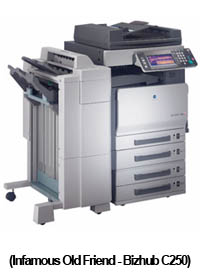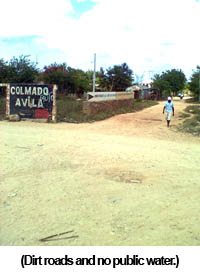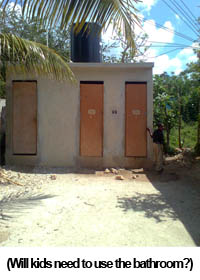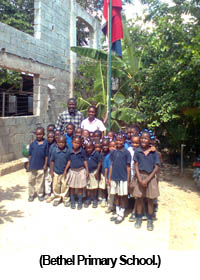![]()
Aaron Roth – HOPE International – May 2011
- Download this email as a pdf: Aaron Roth – May 2011 Update.pdf
- Blog and Support Page: www.AaronRoth.net
- HOPE International Worldwide – www.HOPEinternational.org
- Newsletter Archive: AaronRoth.net – Monthly Newsletters

Back in December, I stopped by a friend’s house before going into the office of Esperanza (HOPE International’s partner organization here in the DR). I looked over to the corner and spotted something that was strangely familiar to me. There stood a 5-year old Konica Bizhub c250 commercial printing machine. But “why” was it doing here?
I asked my friend and he said that a church had donated it to his church about two years ago. I could tell he sensed that I knew something about the complicated machinery covered with dust next to the window. He asked me, “Do you know how to fix it? It doesn’t work.” I laughed and kind of groaned. When I worked in a marketing department back in Richmond, VA, I spent hundreds of hours with our lovely 4-color, 30 pages per minute, automatic duplexing and collating wonder of modern technology. (I remember celebrating the 500,000th copy that we made.) I also knew that even the smallest bump or mishap could mean a call to the specialists and 3-5 hour downtime. There are about eight replaceable parts that need maintenance every six months, and the four toner drums for color last about 2-3 months. In short, running a Bizhub c250 is expensive and requires a trained specialist.
I apologize if it was your church that sent that copier down here, and now I’m using it as an example of overseas charity and development. I will say that it was a nice gift made with the best of intentions, but donating a commercial grade printing machine that needs constant upkeep can be troublesome, not to mention thinking about what might have befallen the temperamental and delicate printing princess during shipment. Again, I’m not really sure what the Dominican Churches needs were over two years ago, and maybe someone did ask the question stateside, “But are they really going to use a Bizhub c250?”
What Do Poor Communities Really Need?
 “But are they really going to use the water?” Maybe that’s what went through his head when an American thought about donating a cistern to a poor Haitian community on the outskirts of La Romana, Dominican Republic three years ago. No, wait. He probably didn’t. I think he had the same feeling that I did when he walked past the barbed wire fence and entered through the sheet metal door to the Bethel Church and Primary School: “There is a real need here and we can help.”
“But are they really going to use the water?” Maybe that’s what went through his head when an American thought about donating a cistern to a poor Haitian community on the outskirts of La Romana, Dominican Republic three years ago. No, wait. He probably didn’t. I think he had the same feeling that I did when he walked past the barbed wire fence and entered through the sheet metal door to the Bethel Church and Primary School: “There is a real need here and we can help.”
I’ve been thinking a lot more about the nature of overseas aid, development and missions work. I’ve seen so many examples of compassion and charity at work here that make me happy. And, I’ve seen a lot of examples where compassion and charity almost worked. As you spend more time in poor communities around here in the Dominican Republic, you see a lot of “projects” that either almost made it to completion or almost made it past their first year of use. Sometimes these projects failed because of lack of knowledge, lack of interest, or often just a mismatch of an understanding of the real needs in an area. I think a lot of gifts were given with good intention, but the real question is always: “Are they really going to use . . .”
On a tour of the small campus of the Bethel Primary School, Reuben shows me the water spigots and the bathrooms that he recently built. The cistern supplies the water to the bathrooms and to the water access points on their school campus. He said that people come to the church and send their kids to school here because they know they have water. People come daily to get water, bringing buckets, bottles or whatever container they can find to transport water. I look around and think that just three years ago, this community did not even have a basic necessity we take for granted: WATER. Reuben shows me the bathrooms they built a few months ago. They have running water and are the only sanitary restrooms in the area.
This makes me think about that original question of usefulness, “But will kids really need to use the bathroom during a school day?” And of course, I laugh because I think we all know the answer to that.
So, as I was talking to Pastor Reuben of the Bethel Church and Primary School about the cistern he said, “This was a gift from the Good Lord, from a man like you.” “A man like me?” I questioned. “Yes,” he said, “An American gave us this water.” Previously, this community did not have running water. So when that American asked three years ago, “Would you use a cistern?” I’m sure Reuben responded with an emphatic “Absolutely we will!”
When They Own It, They Use it
We came to visit Reuben and his daughter Claire because they are applying to be a part of our Edify.org school program. Schools in these programs get access to a low interest rate loan to build more classrooms, science labs, or computer labs. Most of these schools in the areas we work in have concrete floors, usually an old, broken blackboard, barely anything else on the walls, and student desks that are falling apart. When we talk about science labs or computer labs, were talking about four of five pieces of equipment for about a hundred kids. The Edify program is a new initiative with HOPE International and Esperanza that seeks to reach over 50,000 Dominican children with high-quality, low-cost education in the next five years. I’ve already had the opportunity to visit about 25 schools in our branch areas and have met passionate school directors with visions of impacting their local community. When we ask them, “What do you really need?” They usually answer, “More classrooms.”
Reuben knows that to build more classrooms he has to find a way to finance the project. Money does not come easily so he is careful about what financial arrangements he gets involved in. He knows that he will have to own the responsibility of this loan, and whatever he builds, he has to use it. We met Reuben in his office, which doubles as the kindergarten classroom, and we were open and honest with him. When we talk to someone about what we do at HOPE, we start with our vision to carry out  God’s work in the places He has told us to go. We describe our passion for being involved in the community, to connect with the local churches, and our desire to help people accomplish their goals and satisfy their most pressing needs.
God’s work in the places He has told us to go. We describe our passion for being involved in the community, to connect with the local churches, and our desire to help people accomplish their goals and satisfy their most pressing needs.
Reuben takes this financial loan meeting seriously, but smiles and interjects to let us know that, “God helped us build this church and helped us build this school. I trust him with these finances. We have 103 students right now, and I have parents asking me to teach their kids, but I have nowhere to put the students. With this money I will build three more classrooms, and I can add 60 more children.”
Lending money for income-generating activities is what HOPE International does around the world, and in this case, Reuben will be able to recoup the money for the loan with the tuition that the parents pay him per month. It’s only a $5 monthly payment to send a kid to school (which is a lot of money here), but it’s the only good school in the area, and it’s got running water and a sanitary bathroom, and it soon will have almost 170 students.
Again, that original question of “Will they use it?” surfaces in my mind, “But do you really think the local parents want to send their kids to a good school?”
I think we know the answer. We all try to make the best decisions based on what is available to us, and in this community where Bethel Primary School operates, this school is the number one choice.
Thank you for reading and staying in touch. I hope you and your families are doing well.
Blessings,
-Aaron Roth
Skype: aprothwm05
